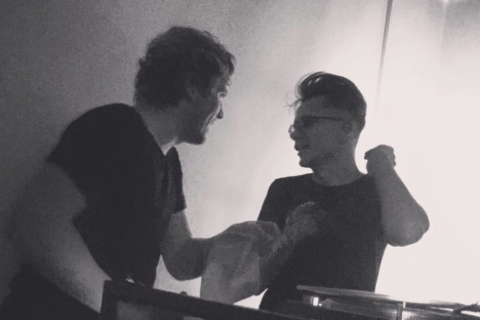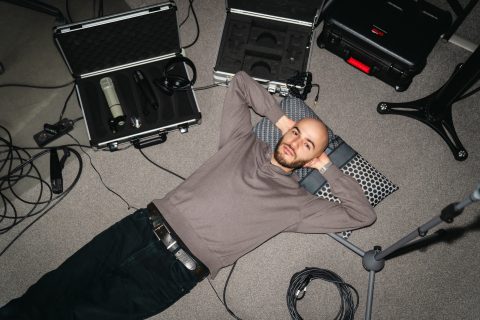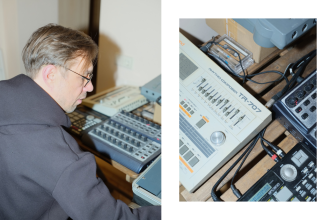A new, fresh, unseen, and high-quality music creator always catches the eye. Perhaps the most striking representative of Kaunas’ current sound emerged a few years ago. Music teacher Jonas Matusevičius, better known as Palmės Žiedas (palm blossom), released a track this year about his hometown, titled “Kaunas – Amerika” – an ironic, free-spirited, and intriguing piece. So, there couldn’t be a better opportunity to finally have a talk with him.
A product of his city
Kaunas has never had a monotonous sound, at least when looking at its musical history over the past few decades. Jazz, metal, noise, and experimental music have always had their place here. When organizing events, we often used to say that if an artist was more interesting or unconventional, they should be brought to Kaunas, not Vilnius.
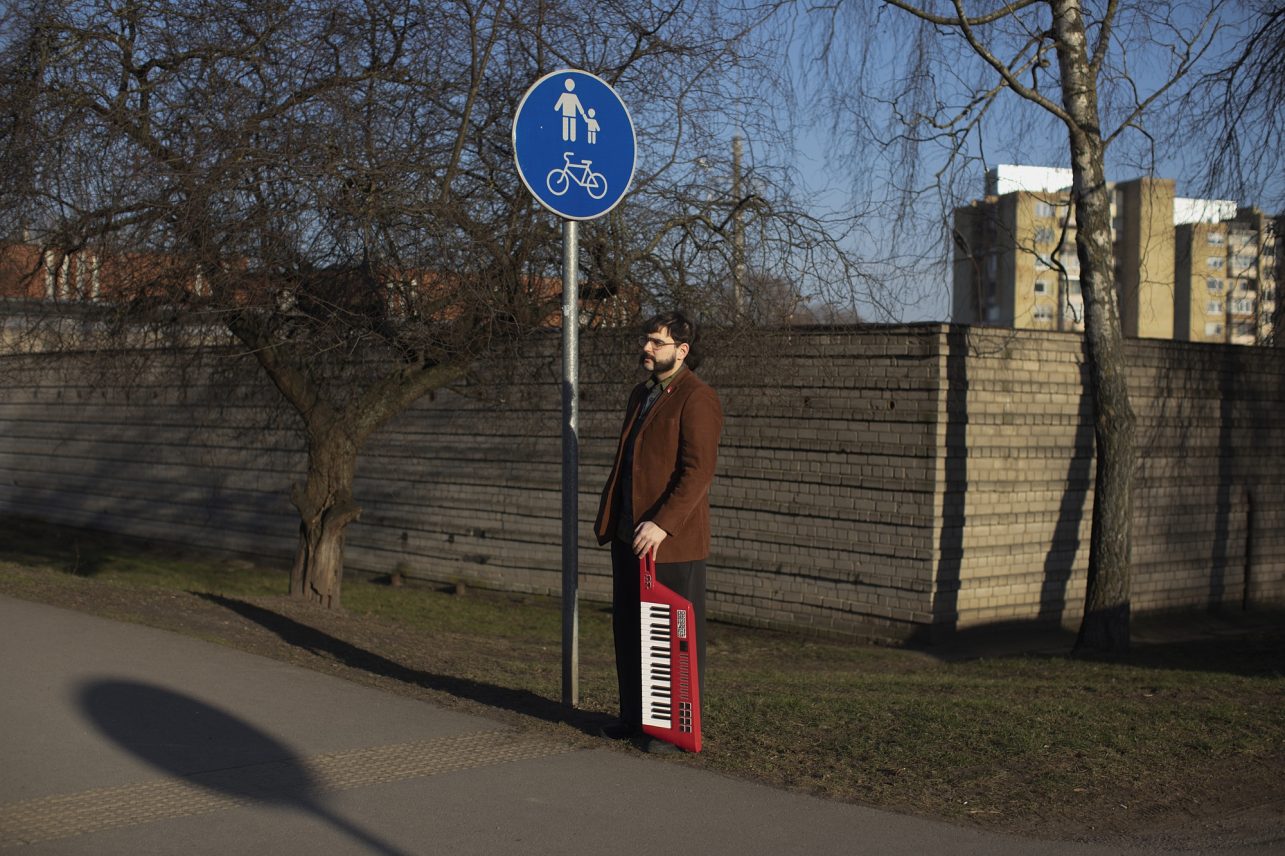
In this sense, Palmės Žiedas is a true product of his city – versatile, constantly evolving, experimental, and never repetitive. His music blends the nostalgic sounds of the late 20th century, elements of psychedelic rock, and the fringes of electronic music. What’s remarkable is that his sonic aesthetic shifts with each new album.
Born and raised in Kaunas, Jonas says that the city has definitely shaped his taste, “Kaunas has always had a certain melancholy that I cannot explain. Maybe it’s the fusion of Soviet-era modernism and nature, maybe it’s a strange Lithuanian sentimentality. I feel like I’m between two epochs, between the city and nature, between the past and the present.”
Palmės Žiedas entered the world of music as a child. He started playing the piano at the age of six and later turned to electronic music production. He also studied guitar with the well-known Kaunas guitarist Mr. Jumbo. In 2017, when he was only 17, he started to create and release his own songs, and Palmės Žiedas gradually became a recognizable name in the alternative scene.
The pseudonym Palmės Žiedas came about almost by accident, “I can’t even fully explain why I chose it. Maybe because palm blossoms don’t exist in Lithuania. Just like my music – it exists somewhere between reality and a dream, between nostalgia and innovation.” Indeed, the name seems almost perfectly suited to the colorful palette and vibrant soundscape of Jonas’ early releases.
More than an experiment
In my lifetime, I have seen dozens of brilliant musical projects that had all the potential to become major names in the local scene but quickly faded because they didn’t put enough effort into the less creative, managerial side of music. Throw a stone at me if you want, but music is also a product – it needs networking, promotion, communication, and audience targeting.
That’s why I especially liked Jonas’ idea that talent alone is not enough. As he himself states, you constantly need to seek opportunities, build connections, and ensure that your music reaches the right listeners. “I participated in competitions, wrote to organizers, and volunteered at festivals. All of this helps to find like-minded people and expand your audience.”
The first real live performance of Palmės Žiedas took place in 2019 in Kaunas, at the cultural bar Godo, where a short film and a music project were presented. “That’s when I realized that music could be more than just a personal experiment,” Jonas recalls. And of course, none of this was simply handed to him: he had to network, ask questions, and take the initiative himself.
Spontaneous processes
Jonas says he has always had a weakness for the recording style of the second half of the 20th century, which is why his work may seem overly home-made or unpolished. In later recordings, elements of progressive and psychedelic rock are inevitable. His latest track, “Kaunas – Amerika”, is described as pseudo-jazz. Jonas has mentioned that the song’s sound reflects the spirit of Kaunas – melancholic yet dynamic.
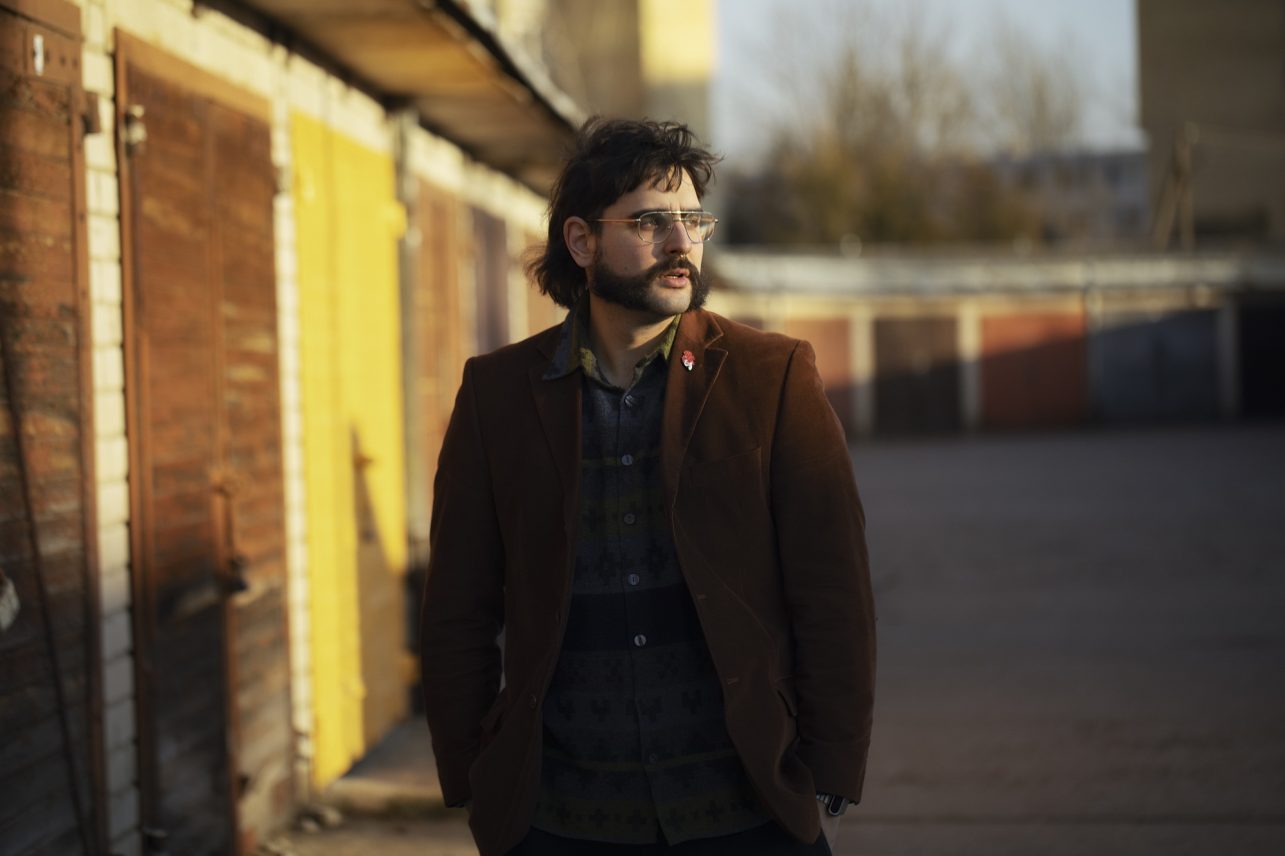
“I don’t want to limit myself to one type of sound. If I feel that I can express myself in another form of music, why not? I don’t know. Maybe the next album will be completely different. Or maybe I’ll start making films instead. But I’ll definitely keep creating,” he says, hinting at his future plans. He mentions an upcoming project, which is unlike anything he has done before – one that will require a lot of collaboration.
When asked how his music is born, Jonas talks about spontaneous processes, “Often it starts with a mood, a feeling, and then the sounds come. Sometimes it’s a coded idea, sometimes it’s just a moment that I want to record.” He writes a lot of music in his home studio, but in recent years he has started to collaborate with other artists.
For him, the music world is not just an individual journey, but also a community. He keeps a close eye on the Lithuanian alternative scene, which, he says, is constantly changing, “Alternative is not a static phenomenon. It used to be mainly rock music, now it can be experimental electronica or post-punk. The most important thing is to have an independent approach.”
Community spirit as inspiration
In addition to his active creative work, Jonas is often seen at jam session nights organized by musically inclined youth at Hogas, the cradle of Kaunas’ alternative music scene. Once a performer at the open mic nights himself, he now appears as one of the jury members deciding which young band will become the most exciting act of the season in Kaunas.
“I used to take part in these competitions and open mic nights, and they helped me a lot. In Kaunas, they are more relaxed, more informal, and on a smaller scale than in Vilnius, but they are no less interesting. Competitions in Vilnius, like Novus, where I won second place, are very serious and professional events. However, they are less community-driven and grassroots,” J. Matusevičius compares.
What allows him to be part of the jury isn’t just his musical skills cultivated since childhood, several successful albums, or his accumulated stage experience – it’s also his professional title. Jonas Matusevičius represents one of the noblest professions: he’s a teacher. He works at several educational institutions in Kaunas, both public and private.
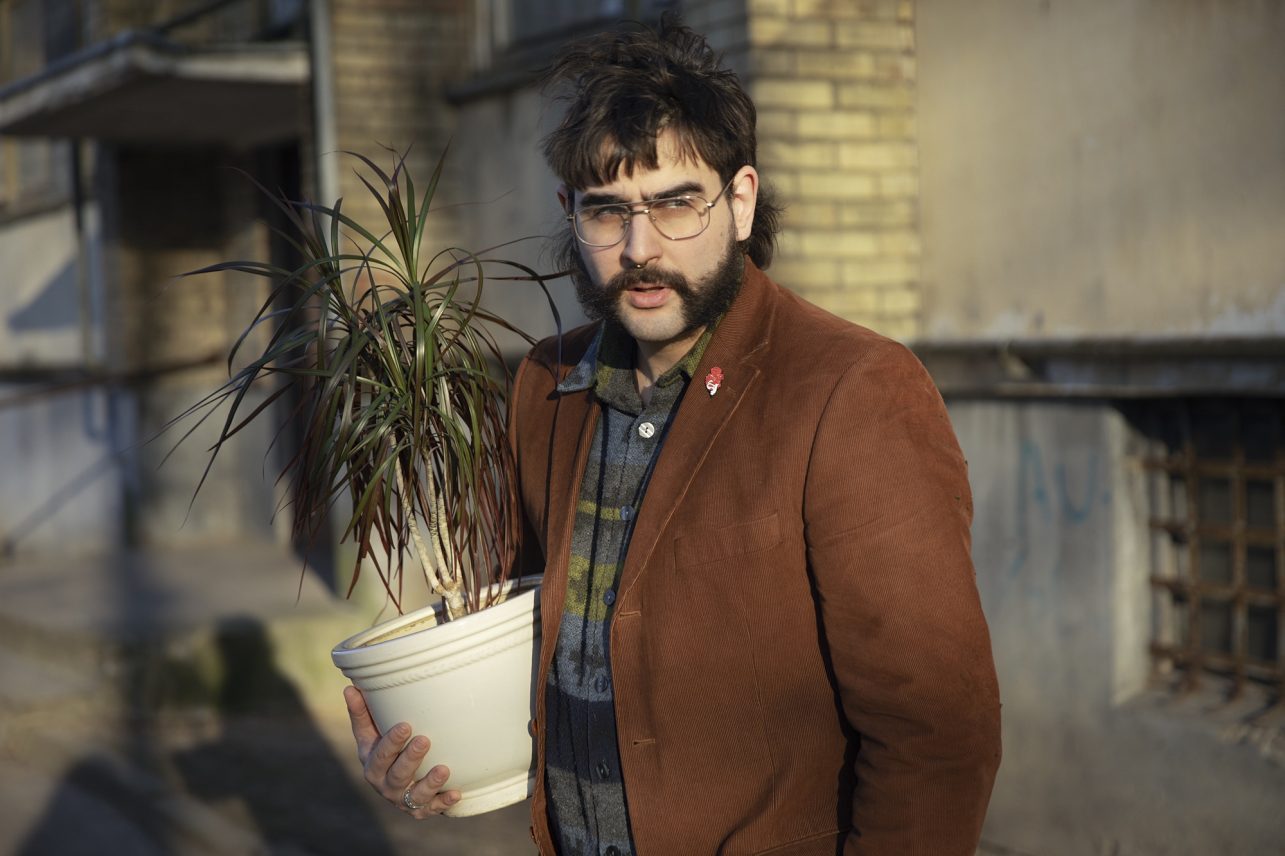
“I have been working as a teacher for some time now. I am also studying professional pedagogy and want to get a qualification. Next year I’ll be pursuing a master’s degree – I’ll study intermedia art. It’s a new specialty in my faculty that includes not just music, which might actually be even better. I’ve studied music all my life, but I’m also drawn to a broader creative field,” Palmės Žiedas says.
Our everyday psychedelics
The psychedelic sound in music has long drifted away from the etymological meaning of the word and the rock-and-roll imagery of the second part of the 20th century, yet it remains just as relevant today. As we talk, we notice that psychedelic features are increasingly present in the music around us lately, for example, in the work of other notable Kaunas-based artists like Flash Voyage, who’ve recently gone quiet.
“The common denominator in my music is psychedelia. Each album is different, telling very defined, conceptual stories, but the similarity remains. I’d say there are two types of psychedelic music: one with a traditional sound, full of massive echoes. And in my work, it perhaps also comes through emotions and narratives. I try to colour not only the music, but also the content,” Jonas says.
It’s common to think that love, for instance, is black, white, or red. But Palmės Žiedas’ music challenges that notion – love can be violet, too. And what does that sound like? Jonas openly shares that, as a child, he loved reading about the Woodstock music festival and the freedom to experiment. This also sparked his interest in the history of Kaunas’ hippie scene: the band Gintarėliai was also an influence.
Jonas ties his attraction to freedom and the desire to explore musical nuances in today’s scene to current realities. “I was drawn by that relaxing quality of psychedelia. Imagine studying engineering, reading the news, and living at the current pace. How can you not like psychedelia, which symbolizes freedom?”
What’s next?
“My recent releases, I’ll admit, were more for myself than for the listener. In the beginning, I did try to cater a bit. Now, I don’t really think about whether something will work or not, I just follow where my creative thoughts lead. And maybe that’s what works, after all, I even got nominated for the M.A.M.A. awards,” Jonas shares at the end of our conversation.
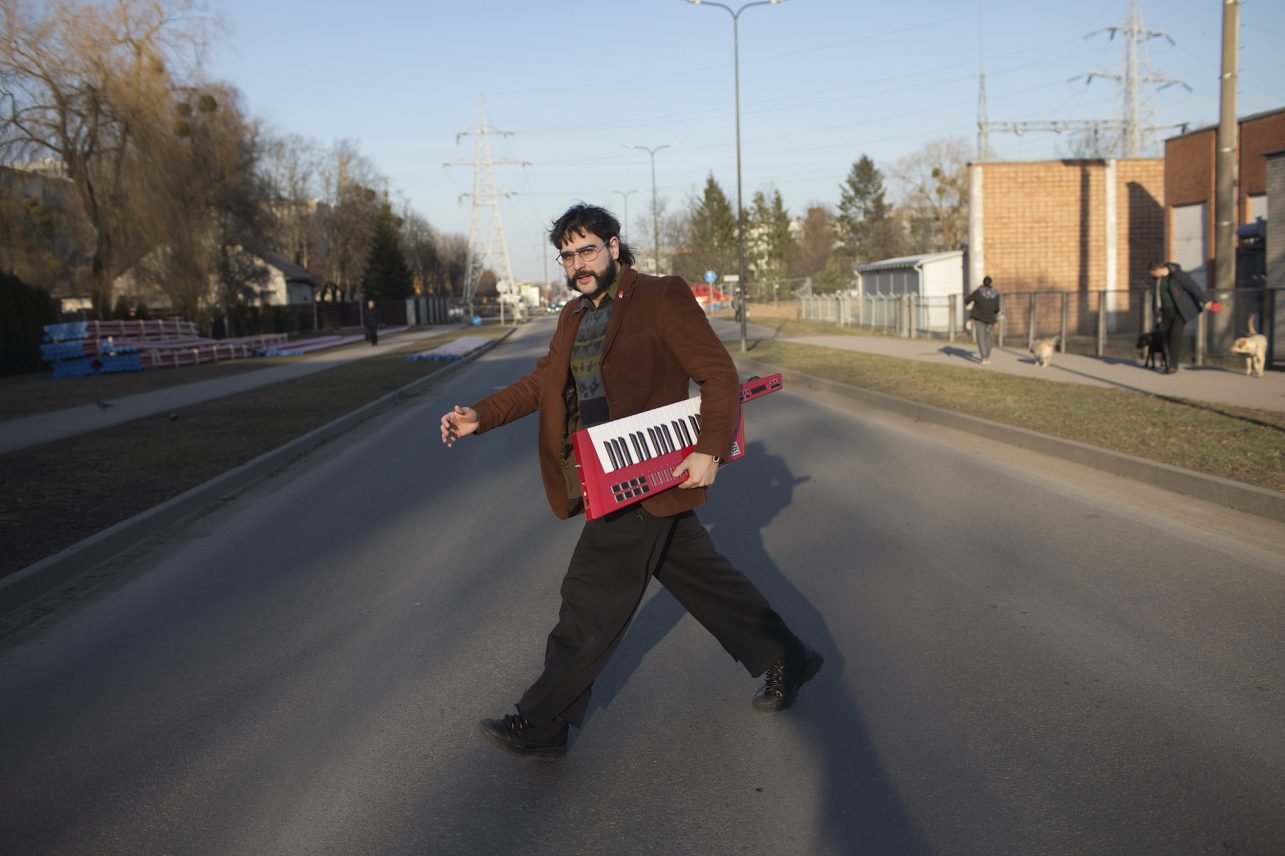
When you dive headfirst into music, you inevitably go through tougher phases too. As Jonas himself says, you must admit that not all decisions will be as easy as you imagined once you become a recognized artist. What to create, how to create, for whom to create. How to maintain balance: to perform more or less? Everything is changing, you have to constantly rethink your choices if you want to maintain originality.
That’s why to this day, Jonas says he doesn’t know what the future holds. “In the past five years, I’ve grown in every way: technologically, in terms of communication, and in working with others. It used to be difficult for me to collaborate. Now I’m slowly learning how to delegate tasks. Still, where this will lead is unclear – and that’s what makes it so exciting.”

